Who Is the True Child of Plato?

by Erica Frank
This week's Star Trek began with Kirk, Spock, and McCoy beaming down to a planet in response to a medical distress signal. The sensors showed no signs of life, indicating that the Enterprise desperately needs new sensors, as this is the third time in recent weeks the sensors have failed to show the people who would soon be assaulting our crew.
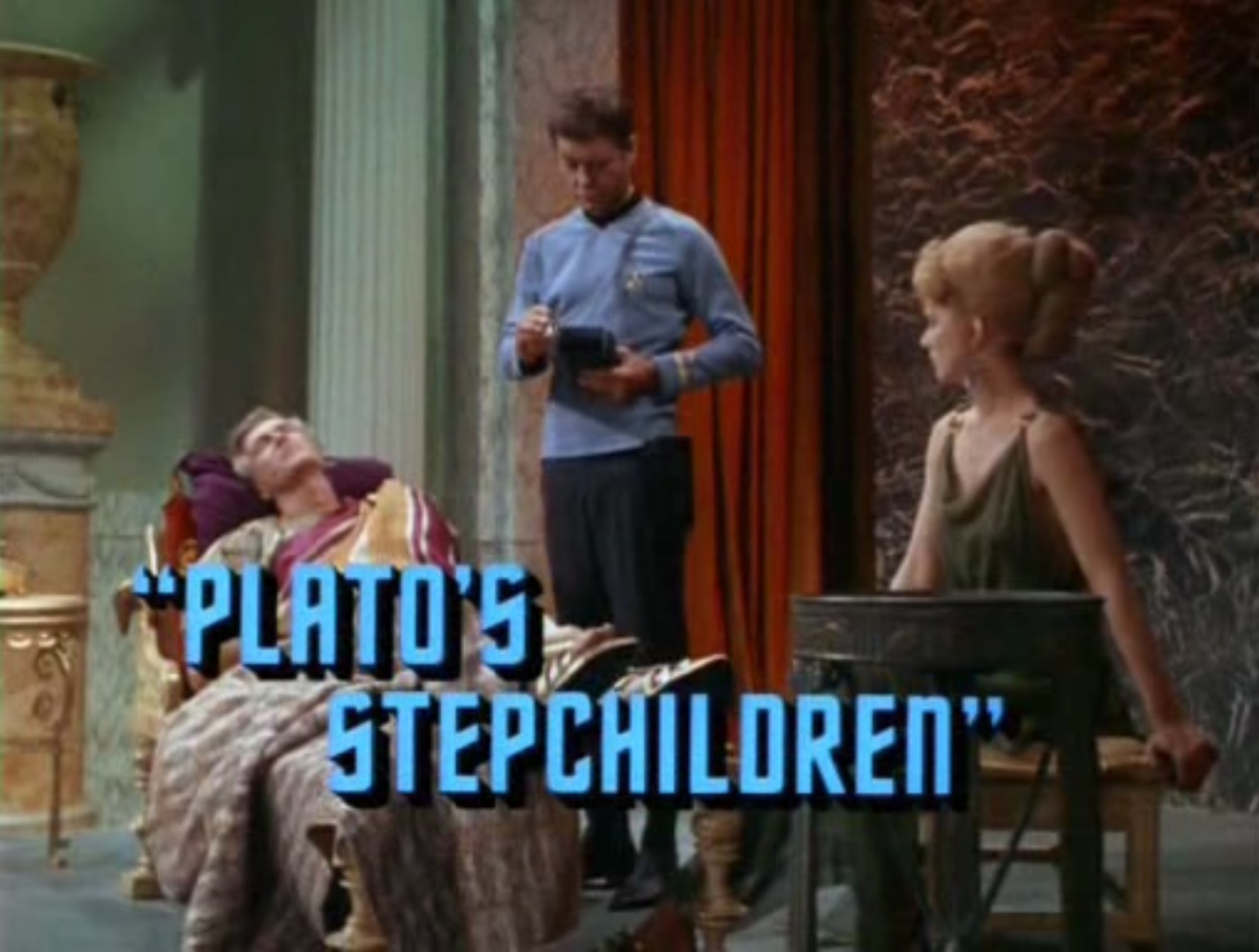
They met the "Platonians," the remnants of a near-immortal race that idolized Earth's ancient Greek civilization and patterned their own after it—or at least, patterned their outfits after it. They have extremely powerful psychokinetic abilities but no infection resistance whatsoever.
Are we to believe these people have never gotten a papercut in the last 2500 years? I shall endeavor to convince myself that their susceptibility to infection is a recent development—that for thousands of years, their environment lacked the bacteria that caused infections in open wounds. Now that it's somehow evolved on their planet, they have no defenses against it.
The Platonians were very grateful for McCoy's medical assistance—so much so that they insisted he stay with them to treat any future injuries they may have. And rather than petition the Federation for volunteer doctors who would love to talk Greek philosophy, they decided that kidnapping with a side of torture and mockery was the way to go.
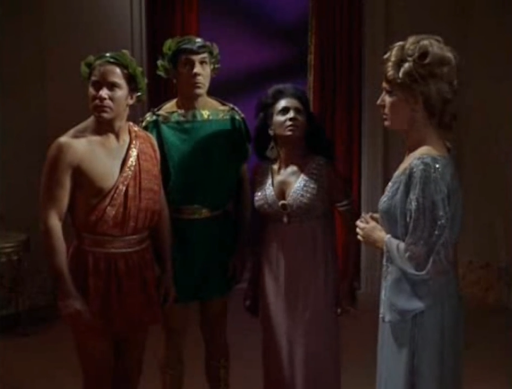
Welcome to Platonius; your compliance with the local dress code is appreciated—and mandatory.
Plato recognized four primary virtues: Courage, moderation, wisdom and justice. Yet we see none of these in their society—if you can call a group of fewer than four dozen a "society," with no children and no growth or change. (Kirk might've called them out for being stagnant, if he weren't busy calling them out for being despotic bullies.) Instead, we have a pack of apathetic lotus-eaters with a penchant for ridiculing anyone who doesn't have their power.
I saw the Platonians and thought, I am so damned tired of stories where psychic powers turn everyone who has them into bratty tyrants. I was delighted to realize that such is not the story here.
Parmen called himself a "philosopher-king," but he was neither. We saw no hint of philosophical insight from him, and no rulership other than "I am stronger than everyone else, so do what I say or I will kill you." He claimed to live in "peace and harmony," but his "peace" was nothing but the threat of force and humiliation.
Alexander, treated as a slave and court buffoon, had the best understanding of Plato's principles. He immediately argued in favor of the strangers' lives, and was punished for it—which he had to know would happen. He did not want access to the power that had tortured him for so long; he only wanted to escape it. He was understandably enraged with Parmen and wanted to kill him, but when Kirk asked, "Do you want to be like him?"—he immediately dropped the knife.
Alexander warned Kirk about the conditions on Platonius, heedless of any future punishment. He wanted very much to get away from the people who had tortured him for thousands of years, but he did not try to dissuade Kirk and his crew from acquiring the same power that had been used against him for so long. He recognized that corruption is not a matter of power itself, but how it's used, and he had enough faith left to trust his new allies. And when he had a chance at revenge—he turned away from it.
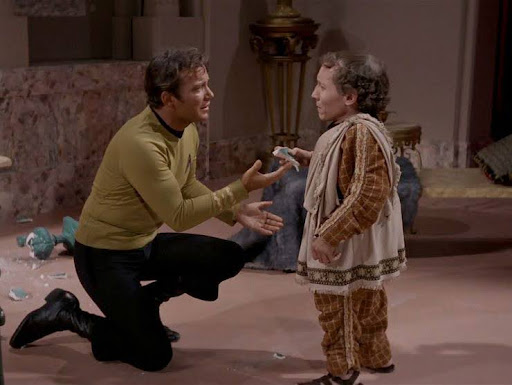
Kirk talks Alexander out of a suicide mission.
Parmen said, "We can all be counted upon to live down to our lowest impulses"—but that's not true. Alexander declined the opportunities for both power and murder. Parmen wants to believe that anyone would turn into a tyrant if given enough raw power… because he doesn't want to acknowledge that the man his court keeps as "a buffoon" has a better understanding of Plato's principles than him and his thirty-odd courtiers.
I can imagine that, in the future, the Platonians are in for some shocking changes. Kirk's report will bring visitors to a planet where psychokinesis is available a few hours after receiving an injection—think of the construction projects that could be done, with no need for clamps or glue to hold pieces in place while they are being assembled. Think of the art that could be created by multiple brushes working together from different angles. Think of the surgeries, with no hands getting in the way, no tool handles blocking the surgeon's view, no gauze compresses interfering with the stitching, because the nurse can pinch the blood vessels shut with a thought.
…And then think of what the Platonians had instead: A sterile world of indolence and petty cruelty.
Five stars.
Katharsis

by Mx. Blue Cathey-Thiele
We get multiple time references in this episode, and many of them are incompatible. They arrived on this planet 2500 years ago, but Philana is only 2300. She was 117 and Parmen 128 when they married. The voyages of the Enterprise take place about two centuries after 1990, according to Kirk in Space Seed, so none of those times match with Plato's lifespan. This is frustrating at first glance, but now I'm inclined to think it works. The Platonians live in a stylized world, based on the appearances and ideas that they have handpicked from Greece and Greek philosophy. It's a facade, set dressing that props up their own personal desires and calls it harmony. I suggest that the infection that McCoy treats is also a ploy, one that Alexander tried to protest before Philana cut him off.
Platonians make the crew move and speak – this is either an incredibly complex set of movements all being controlled at once to move the mouth, lungs, and vocal chords to shape sounds, or a manipulation of the brain itself to force those actions. If they have that much control over bodies that belong to others, surely they can control their own and facilitate healing, or prevent infection from taking hold. Alexander would not necessarily know this though, as he doesn't have that ability, and the others constantly reinforce their control over him. As far as he knows, they did last thousands of years without injury.
Whether the anniversary Parmen references is actually that of 2500 years or not, it is all set up as a performance. He and Philana lead the Platonians in a voyeuristic farce, torturing the crew explicitly and more subtly by making them think that there was ever a choice to leave at all, making McCoy feel complicit in his friends’ pain.
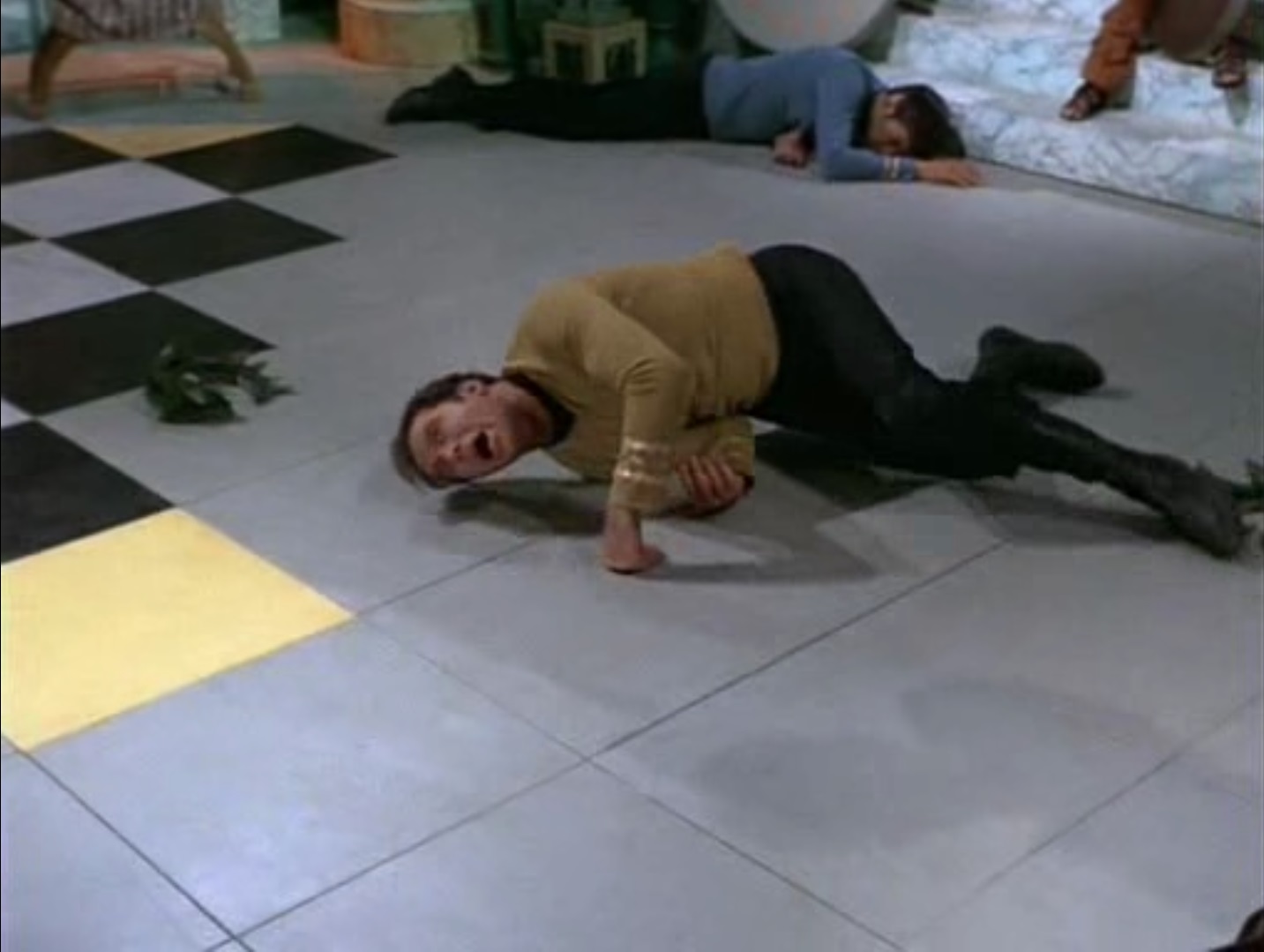
Convulsed with agony, Kirk fights his manipulation
“Tragedy is an imitation of an action that is admirable, complete (composed of an introduction, a middle part and an ending), and possesses magnitude; in language made pleasurable, each of its species separated in different parts; performed by actors, not through narration; effecting through pity and fear the purification of such emotions.” Aristotle, the Poetics
The spectacle of it all reflects aspects of Greek tragedies, interestingly, something Plato's student Aristotle had many thoughts on and wrote about in a reply to Plato's Republic. Through the pain of the “playthings”, Philana and Parmen draw satisfaction. The landing party takes center stage, suitable protagonists for a tragedy, noble and with character traits to be exploited; McCoy's empathy, Spock's stoicism and self control, Kirk's confidence and pride. Uhura's bravery in facing fear and Christine's affection are also twisted to cut right where they are most vulnerable. While the Platonians hardly seem to feel any pity for their victims, they certainly gain an emotional release from the suffering they inflict.
Would I say I enjoyed this episode? Not much of it! But it was a good episode, the way that the crew and Alexander reached out to each other in actions and words amidst the pain was powerful.
5 stars
Refuting Acton's Dictum

by Gideon Marcus
"Absolute Power Corrupts Absolutely"
In many ways, "Plato's Stepchildren" is "The Menagerie" redux: a race of humanoids rendered decadent by their superpowers. "Stepchildren" takes things a step further. The big-headed Talosians were at least willing to do things on their own behalf, including zapping Pike unconscious with a sleepy staff. The Platonians refuse to lift a finger, even to that final confrontation between Parmen and Kirk. How easy it would have been for the 37 Platonians to simply throw something at Kirk, or to step forward for personal combat. Yet they all shrink at the image of Alexander with a knife.
Perhaps it is the nature of the power that so atrophies the Platonians. After all, the Talosian power was that of illusion. The Platonians really do have physical mastery of their environment. Either way, the lesson is clear: power is an irresistible narcotic.
Which is why it's so refreshing when it isn't.
McCoy, in creating a telekinesis potion (and that was an excellent scene combining science and computers in a logical fashion a la "Wolf in the Fold"), has unlocked a frightful Pandora's Box. Who wouldn't want those kinds of powers? Answer: Kirk doesn't. He much prefers to do things for himself. Alexander doesn't. He's seen what happens to those who partake.
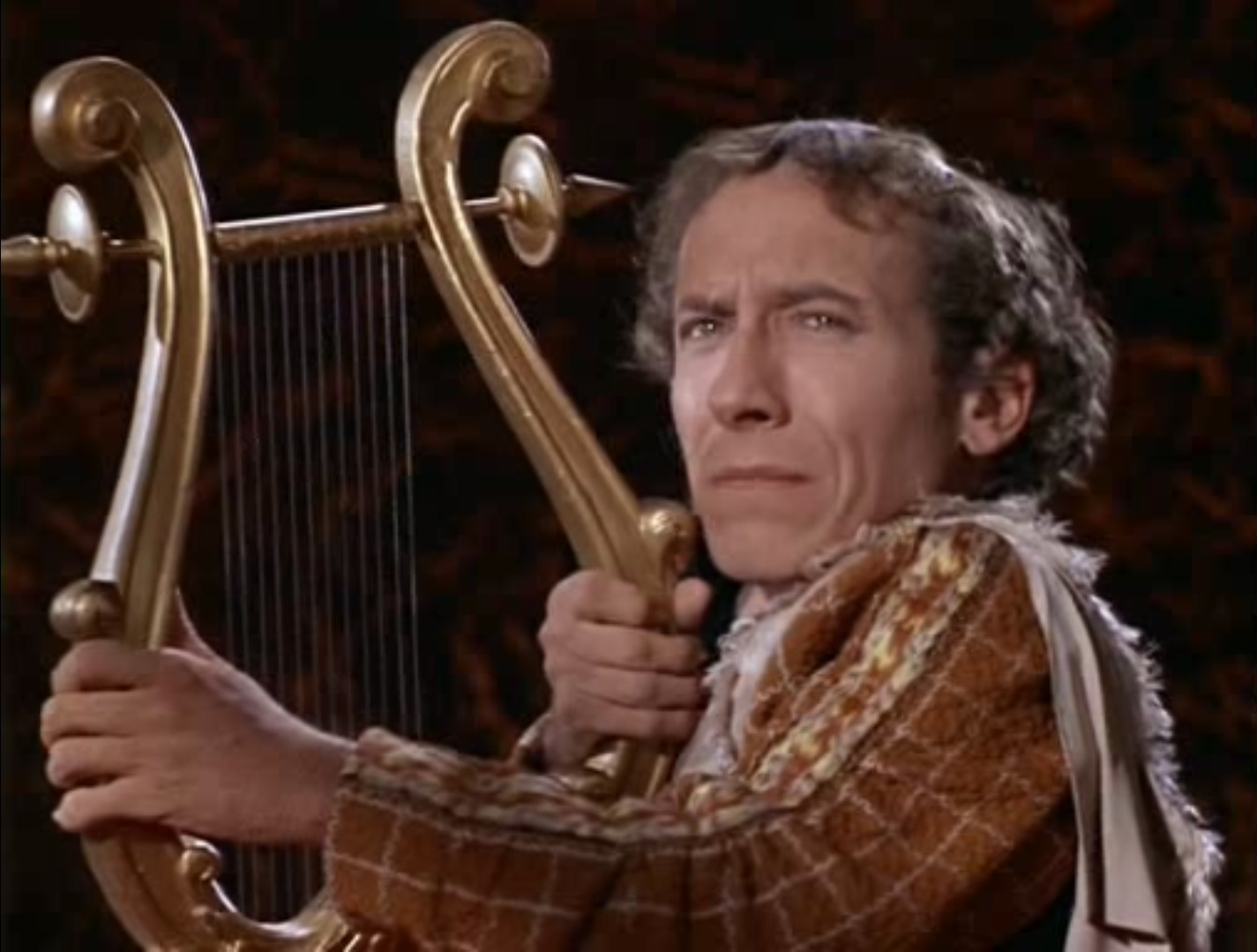
Alexander, handsome star of the show
And can we just turn a spotlight on Michael Dunn's performance as Alexander? In an episode characterized by excellent performances, Alexander yet shines. Humble, noble, resourceful, admirable, vengeful, not to mention the incredible physical control he displays, alternating from painful hobbling to acrobatic feats as he is "thrown around" by Parmen. Bravo. I could not have loved Dunn's character half so much were he not so well-realized, nor would the lesson to be learned from the Platonian's folly have been so effective.
There's not much to this episode—just a few sets, a lot of talking, a lot of torture. On the other hand, with such tools, Aeschylus created Prometheus Bound, and I think "Plato's Stepchildren" will be as enduring a classic.
Five stars.
In the Face of Oppression

by Lorelei Marcus
Fear is power. It is a tool of control, wielded to maintain hierarchy and oppression. Plato's stepchildren (the Platonians) reveled in the fear they caused in others, or seemed to cause, and the sense of control it gave them.
Yet Uhura said, even as her body moved against her will, "I am not afraid." While the Platonians had physical control, her defiance was a resistance, a crack in the facade of their total dominion.
I have to wonder if Nichelle Nichols was at all afraid acting this scene, for her kiss with Shatner, too, was a kind of resistance. What ripples and backlash will this episode create? What consequences will she, the actress, have to face? Perhaps she found strength, like Uhura drew courage from the Captain's prior steady influence, because she was not the first.
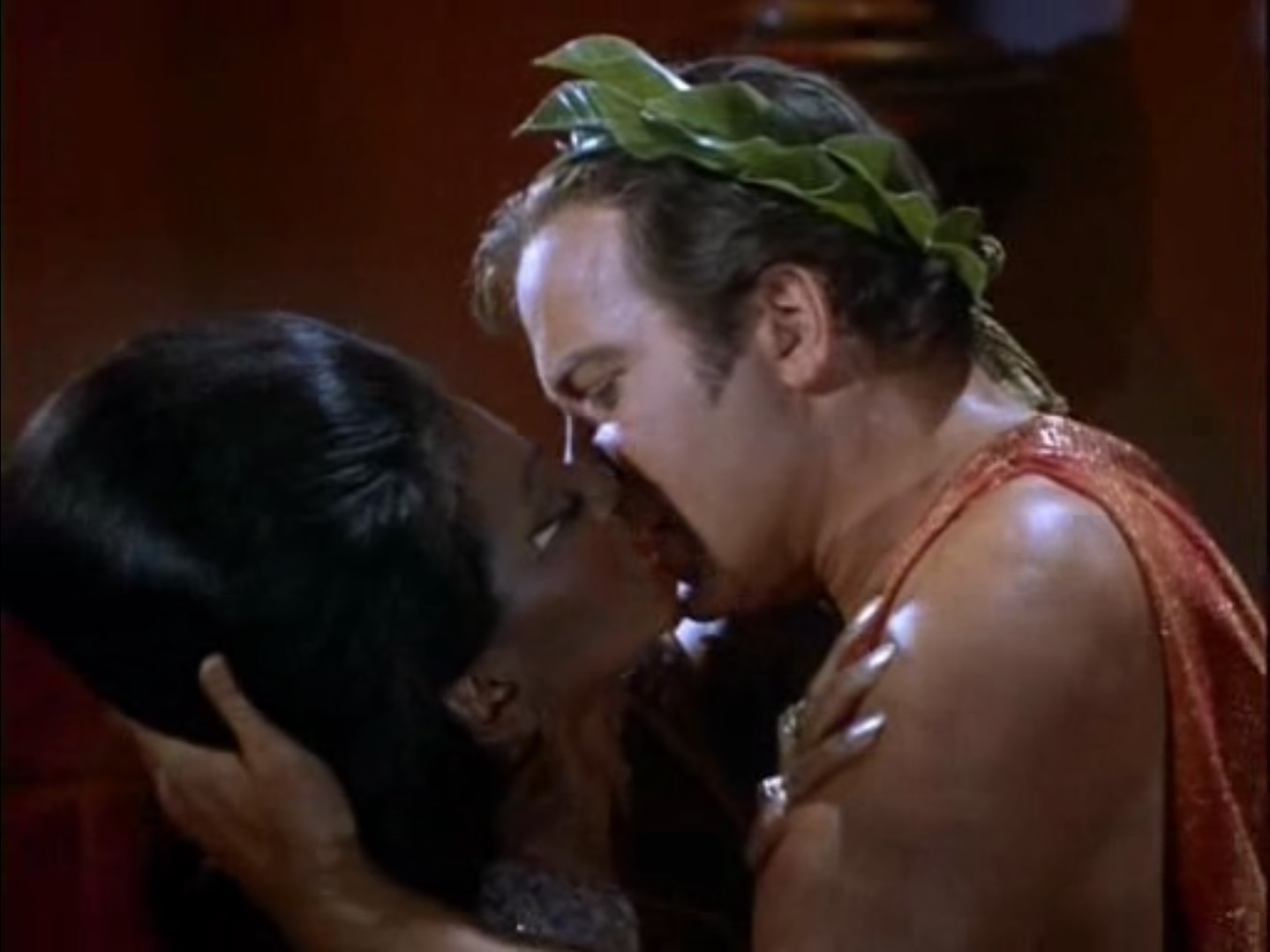
The performance of the actors, so clearly resistant, undercuts any torrid interpretations
Last year, Nancy Sinatra had an hour long musical special featuring several of her groovy tunes strung together through a loose narrative exploring her life and the people in it. It was an all-star cast, including dance numbers arranged by the choreographer for Hullabaloo and cameos from several members of the Rat Pack. Two of the numbers, successively, featured Dean Martin and then Sammy Davis Jr. Both were duets, and both ended with Nancy kissing them, much like a girl kisses her uncle, or performers kiss in greeting/departing. The kisses were sweet and harmless—and very deliberately staged for impact, particularly the latter kiss. When Sammy and Nancy kiss, it looks impromptu, but the performers deliberately caused the embrace to occur at the end of the shooting day, right before Sammy had to leave, such that the director couldn't demand a retake.

Black meets white on Movin' with Nancy
I don't know if there has been much reaction to that kiss, but I have seen Sammy host Hollywood Palace a few times since, and his activist spirit only burns brighter and more fervently the more he appears. He's trying to drive change and inspire others to follow. That kiss was only one of example of his efforts.
And with Star Trek and Nichelle Nichols following in his footsteps, not to mention groundbreaking movies like Guess who's coming to dinner?, I think that momentum is building.
In the face of a fearsome enemy, the two primary human reactions are paralysis and/or anger. Plato's stepchildren evoked both as I watched our beloved characters manipulated like puppets. It also inspired me, in the face of overwhelming crisis and inequality, to not be afraid. Indeed, I will hold onto my fury and let it drive me, until we have the power to overcome our oppressors.
Five stars.
[Come join us tomorrow (November 29th) for the next thrilling episode of Star Trek! KGJ is broadcasting the show live with commercials and accompanied by trekzine readings at 8pm Eastern and Pacific. You won't want to miss it…]

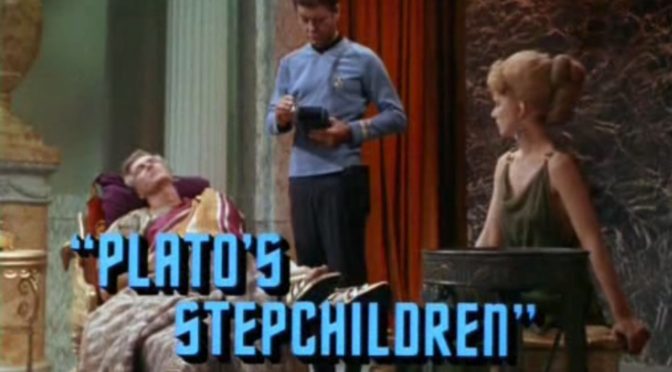
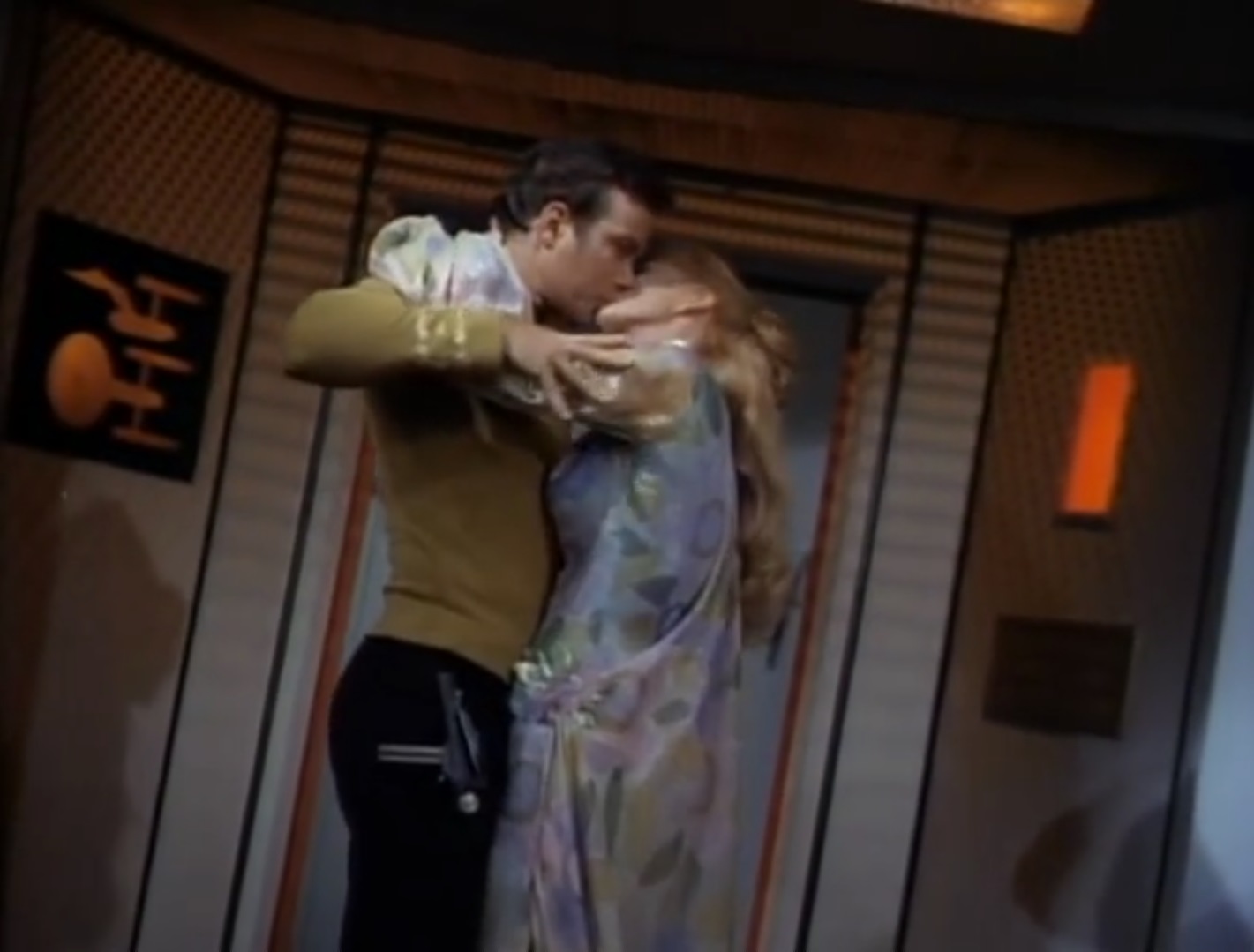


Five stars across the board? That's impressive, but I'm not entirely convinced it's deserved. It's a very good episode, with an absolutely brilliant performance by Michael Dunn. Nevertheless, I see a few things that bring it down a little for me.
The biggest problem is that there doesn't seem to be quite enough story here for a one hour episode. The padding to fill out the time seems to be entirely in the torture scenes, which carry on long after their point has been made. Making Kirk play horsey and Spock laugh and cry would have been enough. Loading those in after the doggerel song and dance number and following them up with Spock's song and the flamenco number danced around Kirk's head was laying it on a little too thick. On a smaller scale, two cracks of the whip at Uhura would have sufficed, rather than the four or five we got. It all became too repetitive. A little philosophical discussion might have served better to fill some screen time.
That said, a good four stars for me, and Michael Dunn deserves an Emmy.
I'm surprised that the commenters mostly rate it so highly, considering the plot holes they reference and the nasty extended torture scenes. (Torturing his friends might convince McCoy to stay, but it's not going to convince him to give the Platonians good care if he does.) It's true that Alexander is an interesting character, and it's fun to hear Nimoy (and Dunn) sing, but otherwise I feel it was outstandingly dreadful.
I'm with you, Ruth. This one was unpleasant to watch, one of the worst Star Treks ever so far as I'm concerned.
These were my field notes on this show.
Wig Trek: An outstanding show
Cave Trek: no
Fog Trek: yes
Doinnggg Trek: no
Love Trek: no
Basically this is about 40 minutes of bullying sandwiched between opening teaser and the closing credits. I hated it. It was a relief when it was over. It’s the worst Star Trek teleplay so far.
To keep viewers interested, the script largely relies on new forms of meanness and humiliation. It’s obvious that the Platonians are nasty folk who have a psi-type power, and we know they will be defeated somehow. But what a pathetic way to try to keep viewers interested.
I’m tired of human aliens who have the power to disturb the Enterprise from hundreds or thousands of miles away (cf. “Catspaw”).
In “Where No Man Has Gone Before,” Gary developed his psi powers and makes things float around, eventually makes Kirk do physical things (press his hands together in supplication, etc.). But that was a compelling drama. Here the psi powers (conferred by the native diet, we learn –!) feel like being a means to fill up time before the inevitable denouement.
I’ve read some of Plato’s dialogues. Maybe some early version of the script actually did something interesting with Plato (e.g. The Republic). Anyone watching this thing and not already acquainted with Socrates would be none the wiser for his or her time spent.
Maybe someone else will find something favorable to say about something in this show, but in my opinion it should never have been made. It’s a shame that, with its budget problems, Star Trek wasted money on this thing. Too bad the actors didn’t refuse en masse to do this one.